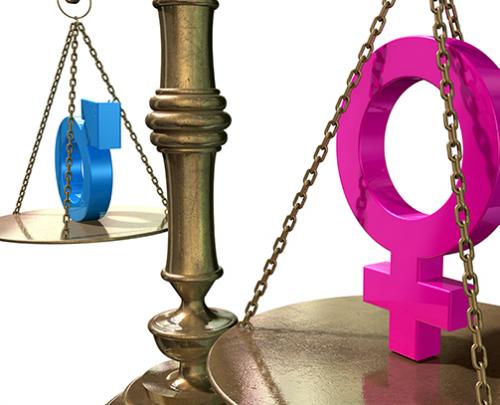Helzberg School of Management
6 Ways to Increase Gender Equity in Your Workplace

In the last century women’s roles changed dramatically as women gained the right to vote, were empowered by civil rights and equal pay legislation, and increasingly participated in business and political spheres. Equity*, however, is still far off for women. Society still struggles with gendered issues such as sexual harassment, maternity and paternity postpartum leave, and implicit bias, to name a few. Both organizations and individuals have much work to do to achieve enduring equity for women. A good first step is to build awareness of practices that perpetuate privilege for men and impede equity for women.
Here are some personal practices to employ to ensure that you’re treating the women you work with in an equitable, respectful way:
- Don’t assume a woman is taking the surname of the person they marry. Ask: “Are any names changing, are they taking your surname or will you take theirs?” Normalizing both parties keeping their surnames or a male taking a different surname during marriage recognizes the partnership as between two equals. The assumption that a woman will take her spouse's surname is rooted in misogynistic, dehumanizing historical practices.
- Don’t complain that a co-worker accused of sexual harassment is a “good guy” and resent any consequences they face for their actions. There are many sexual predators out there, many of whom do not look or present as a monster. An outward appearance of being a “good guy” doesn’t change the need for accountability in that case that someone has caused harm and shown disrespect by harassment or predatory behavior.
- Don’t keep quiet about accomplishments you see from your female colleagues. Studies have shown that women are less likely than men to hype up their accomplishments. Be an ally by sharing out the good work you see to a manager or other team members.
- Do look around the room during meetings and observe demographics. Are there two women and ten men? Who is speaking? What is validated or invalidated when a woman contributes?
- Stop using (and call out) patronizing language. Did an older male colleague call a 30-year woman a “girl” or “young lady”? Though such a gesture may not be explicitly malicious, neither is it entirely respectful. There is language that can be appropriately used between female friends that it inappropriate and demeaning when used in a professional setting. Be willing to firmly, without drama say that it would be better to refer to the female in more respectful terms.
- Recognize your own missteps and apologize. Everyone is learning, and we all grow when there is reflection and resolution. Humility will take you far!
*To disambiguate between “equality” and “equity”, activist DeRay McKesson provides a helpful analogy: Equality is giving everyone a shoe and equity is giving them a shoe that fits.
Bridget Barry is a current MBA student, yoga instructor and writer.








